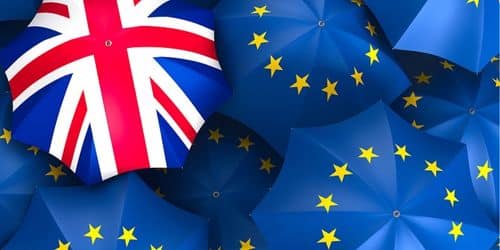Brexit, a mashup of the words British and exit, was created to describe the United Kingdom’s decision to leave the European Union (EU) following a referendum on June 23, 2016. The European Union came into being with the Maastricht Treaty’s ratification in November 1993. The nations that signed the document for the first time were Belgium, Denmark, France, Germany, Greece, Ireland, Italy, Luxembourg, the Netherlands, Portugal, Spain, and the United Kingdom. Because of a few factors, the majority of British voters chose to leave the EU.
Brexit, saw Britain leave the union at the end of January 2020. But there were difficulties with the move as well. Before finalizing everything, a two-year negotiation process and a one-year transition period were necessary.
What Is Brexit
The term “Brexit” describes Britain’s departure from the European Union. Following a national referendum in June 2016, Brexit was implemented on January 31, 2020. 51.9% of voters chose to leave the EU, while 48.1% chose to stay. Between 2017 and 2019, talks on the specifics of a divorce agreement took place between the U.K. and the EU. After Brexit, there was a transition period that ended on December 31, 2020.
On January 1, 2021, the UK parliament gave its approval to a provisional agreement. On April 28, 2021, the European Parliament gave its blessing. 2 The Trade and Cooperation Agreement (TCA), as it is also known, permits tariff- and quota-free trade in goods, but customs inspections are still required for trade between the UK and the EU. As a result, trade is not as fluid as it was when the UK was an EU member.
What Are Brexit Deals
Brexit, which stands for “Britain” and “exit,” is an acronym for two English words and refers to the UK’s process of leaving the EU.
Article 50 of the Treaty on the European Union governs how any Member State may withdraw. This rule states that any EU member state has the right to withdraw under its national constitution. The EU will negotiate with this State about the timing and terms of its withdrawal from the EU after notifying it of its decision.
Following the vote on June 23, 2016, the European Council was notified, and on March 29, 2017, the United Kingdom officially started the withdrawal process.
Although the UK left the EU on February 1, 2020, the Withdrawal Agreement took effect on that day and thereafter, ensuring an orderly exit while maintaining the application of the acquis communautaire in their relations until December 31, 2020.
The “Trade and Cooperation Agreement,” an ambitious agreement that amounts to a significant change for people, businesses, and public authorities in the EU and the UK, will serve as the foundation for relations between the UK and the EU as of 1 January 2021.
What is the Trade and Cooperation Agreement?
The Trade and Cooperation Agreement is a free trade agreement that does away with tariffs and quotas between the UK and the EU. It also establishes a title on level playing fields, which is one of the main demands the EU made during the negotiations and creates the framework for fair competition.
It also creates a framework for cooperation in the fields of fishing, economics, social welfare, and the environment. This framework includes clauses that ensure transportation and energy connectivity, as well as coordination in social security-related areas.
The trade and cooperation agreement also governs a group focused on internal security, which is based on Europol and Eurojust and includes provisions for detainee transfers, combating money laundering, and funding terrorism.
The agreement also creates a framework for institutional governance and an “Association Council” that is co-chaired by a ministerial-level representative of the British government and a member of the European Commission. This council, with the aid of specialized committees and working groups, will supervise the application of the agreement.
What Is The Withdrawal Agreement?
The terms of the United Kingdom’s departure from the European Union and the European Atomic Energy Community (EURATOM) were outlined in the Withdrawal Agreement. Its text was originally agreed upon by negotiators on November 14, 2018, and endorsed by the European Council (Article 50) on November 25, 2018.
The two parties’ negotiators revised the Withdrawal Agreement’s text following a change in the British government, especially concerning the Protocol on the Republic of Ireland/Northern Ireland. On October 17, 2019, the parties to the negotiations came to a new agreement. The new document was approved by the European Council (Article 50) on the same day.
The Withdrawal Agreement was signed on January 24, 2020, by the UK and the EU. The Withdrawal Agreement went into effect on February 1, 2020, as a result of the European Parliament’s approval on January 29, 2020, and the European Council’s decision to conclude the Withdrawal Agreement on 30 January 2020.
What Was The Transition Period?
The Withdrawal Agreement, which called for a transitional period ending on December 31, 2020, during which the acquis communautaire of the EU would continue to govern relations between the EU and the UK, was the direct cause of the Transition Period.
Only once, for a maximum of one or two years, may this period be extended; however, any such extension would have required mutual consent between the EU and the UK before July 1, 2020. Before the cutoff, the UK, however, rejected this possibility.
EU law was still in effect in the UK during this time. Except for the UK’s participation in governing bodies and EU institutions, the EU maintained its ties with the UK as though it were a Member State.
Additionally, the agreement was decided upon during the transition period to control relations between the parties beginning on January 1, 2021.
Brexit Consequences
The decline in the value of the pound was a direct result of Brexit. Due to the weaker pound, UK investors had to pay more to invest in countries like the US and China. Free trade, reciprocal market access, and other assistance programs are all part of the EU-UK Trade and Cooperation Agreement (TCA). Brexit had a negative impact on the UK’s service trade balance and its goods trade balance because some goods needed to go through strict checks and approvals, instead of free trade.
After Brexit, the London stock market became more erratic. Derivatives made a significant shift to the Amsterdam and New York stock exchanges. Within days of Brexit, the service, transportation, and hospitality industries in the UK were experiencing a labor shortage. Since many of the workers in the UK’s economy were from EU nations and were no longer able or willing to do so, there was also a decline in the number of workers.
The EU needs to come up with plans to fill the economic and financial void left by Brexit. In terms of foreign trade, the UK has recently finalized new trade pacts with nations outside the EU like Australia, China, and the US. Because of this, the nation’s relations with other nations have improved, enabling UK consumers to benefit from cheaper products from non-EU countries.
10 Reasons for Brexit
There were several reasons for Britain’s decision to leave the European Union. However, a rise in nationalism, immigration, political autonomy, and the economy were some of the key factors that led to Brexit. Nearly 52% of the vote went to the Leave side, while 48% went to the Remain side.
- Given that the EU was the main market for British exports, there was a risk in leaving the EU’s decision-making process.
- Benefits to society and the economy of the four EU freedoms: the unrestricted cross-border flow of capital, people, goods, and services.
- To stop or reverse the process of EU influence in the UK, leave voters are said to have been strongly motivated by the perception that joining the EU further distanced decision-making from “the people” in favor of regulatory bodies.
- Immigration: According to a poll conducted, one-third (33%) of those who voted to leave said the reason for their decision was as a result of the fact that leaving would give the UK the best chance at regaining control over immigration and its borders.
- Economy: Trade agreements with nations outside of the EU were something that free trade supporters hoped to negotiate after Brexit. For instance, Brexit was essential if Britain was to be free to discuss trade agreements with countries like the United States.
- Policy decisions: According to some, the relatively high net migration rates into the UK over the past ten years account for migration’s important role in influencing referendum voting patterns.
- Media
- Influence of politicians
- Campaign factors: The leave campaign had a strong following on both ends of the country thanks to its capacity and decision-making to hand-pick policies in specific regions of the nation.
- Demographic and cultural factors: Among other things, voters’ age, education, and integration into the EU were all contributing factors to Brexit.
Brexit Countries
The only member of the EU to leave Great Britain. Austria, Belgium, Bulgaria, Croatia, Cyprus, Czech Republic, Denmark, Estonia, Finland, France, Germany, Greece, Hungary, Ireland, Italy, Latvia, Lithuania, Luxembourg, Malta, Netherlands, Poland, Portugal, Romania, Slovakia, Slovenia, Spain, and Sweden are among the nations that make up the European Union.
How Is Brexit Affecting the UK?
Since many of the workers in the UK’s economy were from EU nations and were no longer able or willing to do so, there was also a decline in the number of workers. Following Brexit, the EU will no longer recognize UK vehicle safety certifications. As a result, to sell cars in the EU, UK automakers must adhere to additional regulations.
What Is the Main Reason for Brexit?
Following the success of the Brexit referendum, Brexit was formally initiated on June 23, 2016. Nevertheless, there had been mounting pressure for such a referendum for a while. Numerous factors, including concerns about immigration, national sovereignty, and money, contributed to the referendum’s success. In Britain, immigration has long been a problem. There are also claims that European citizens in general feel more integrated with the EU than Britons. UK citizens are more likely to identify as British than European.
Money matters also affected referendum votes and were the subject of complaints about false information. During the campaign period leading up to the referendum, the Leave campaign claimed that the UK’s weekly spending would rise by £350 million as a result of leaving the EU. Not only was the amount wrong, but it also failed to account for the money saved from EU-related discounts and rebates.
What Did Brexit Do to the EU?
The budget of the EU, however, received a significant amount of funding from the UK. The UK made contributions totaling £7.8 billion annually between 2014 and 2018, on average. The EU budget has a 5% shortfall as a result of Brexit. Now, the EU needs to close this funding gap by either lowering costs or increasing contributions from other members. Both the UK and the EU are seeking new trading partners in terms of trade.
Who Benefits From Brexit?
Many financial institutions relocated from the UK to the EU. It gave the EU’s financial sector new opportunities for trade and employment. Because of Brexit, trade ties with nations like China, Canada, and India improved, which in turn aided in the country’s economic growth.
Has Brexit Hurt the UK Economy?
Brexit hurt the UK’s service trade balance as well as its goods trade balance because some goods were now subject to stringent inspections and approvals. instead of using the previous free trade agreement.
It hurt foreign direct investments. Since the UK is no longer a point of entry to the EU single market, investors have had to come up with new methods of entering the EU.
After Brexit, the London stock market experienced significant volatility. It lost three-quarters of its derivatives share trading to the New York and Amsterdam stock exchanges.
Conclusion
The majority of British voters chose to leave the EU as a result of rising nationalism, worries about the economy, and demands British sovereignty. The end of January 2020 saw Brexit, as the United Kingdom left the union. But there were difficulties with the move as well. Before the final conclusion, there were two years of negotiations and a year of transition.
What Is Brexit FAQs
What Is Brexit?
The term “Brexit” describes Britain’s departure from the European Union.
How Is Brexit Affecting the UK?
Following Brexit, the EU will no longer recognize UK vehicle safety certifications. As a result, to sell cars in the EU, UK automakers must adhere to additional regulations.
Who Benefits From Brexit?
Many financial institutions relocated from the UK to the EU. It gave the EU’s financial sector new opportunities for trade and employment.
Related Articles
- Learn How To Sell Vape Products Legally In The UK
- VOIP PROVIDERS: 21+ Top Best Services For any Business in The UK (Free & Paid)
- EUROPEAN CAR BRANDS: Top 19+ Luxury European Car Brands in the USA
- SWISS BANK ACCOUNT: How To Open A Swiss Bank Account
- WHAT IS HYPERINFLATION: Causes, Examples & How to Prepare
- MUTUALLY EXCLUSIVE: What It Is, in Business and Examples






